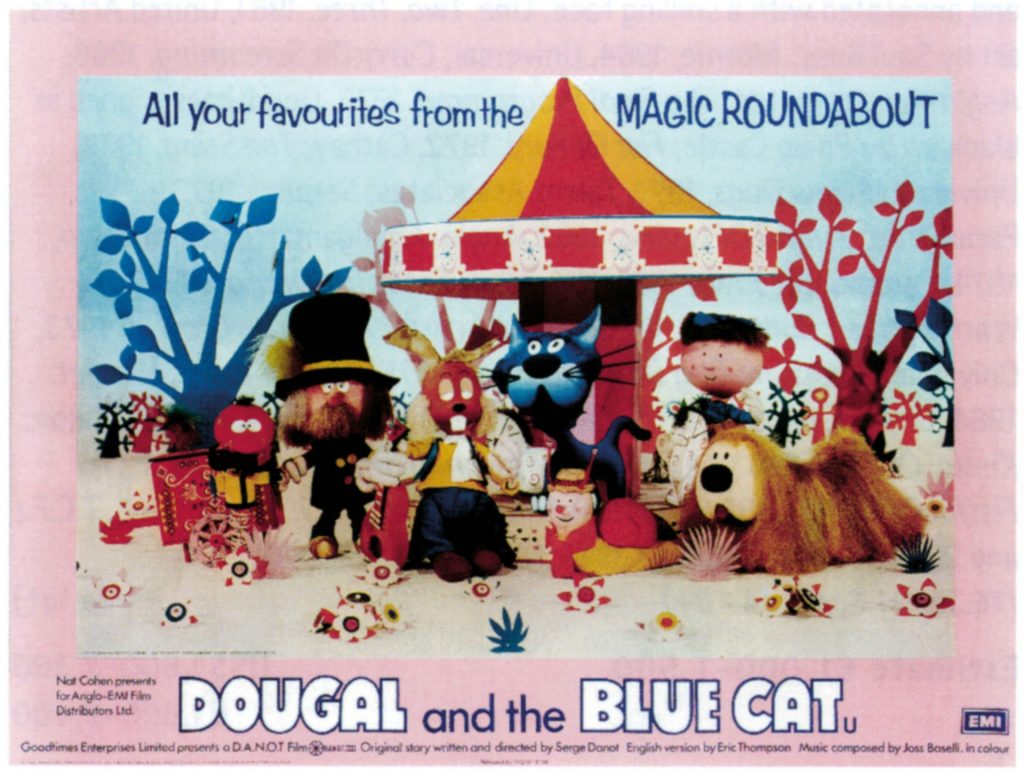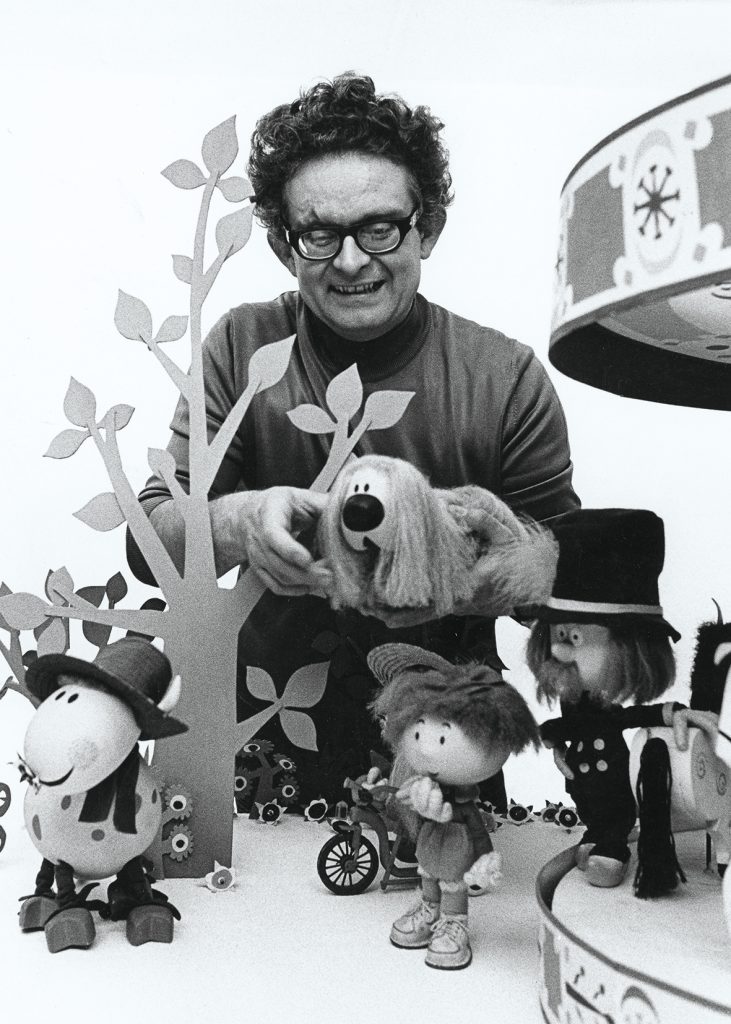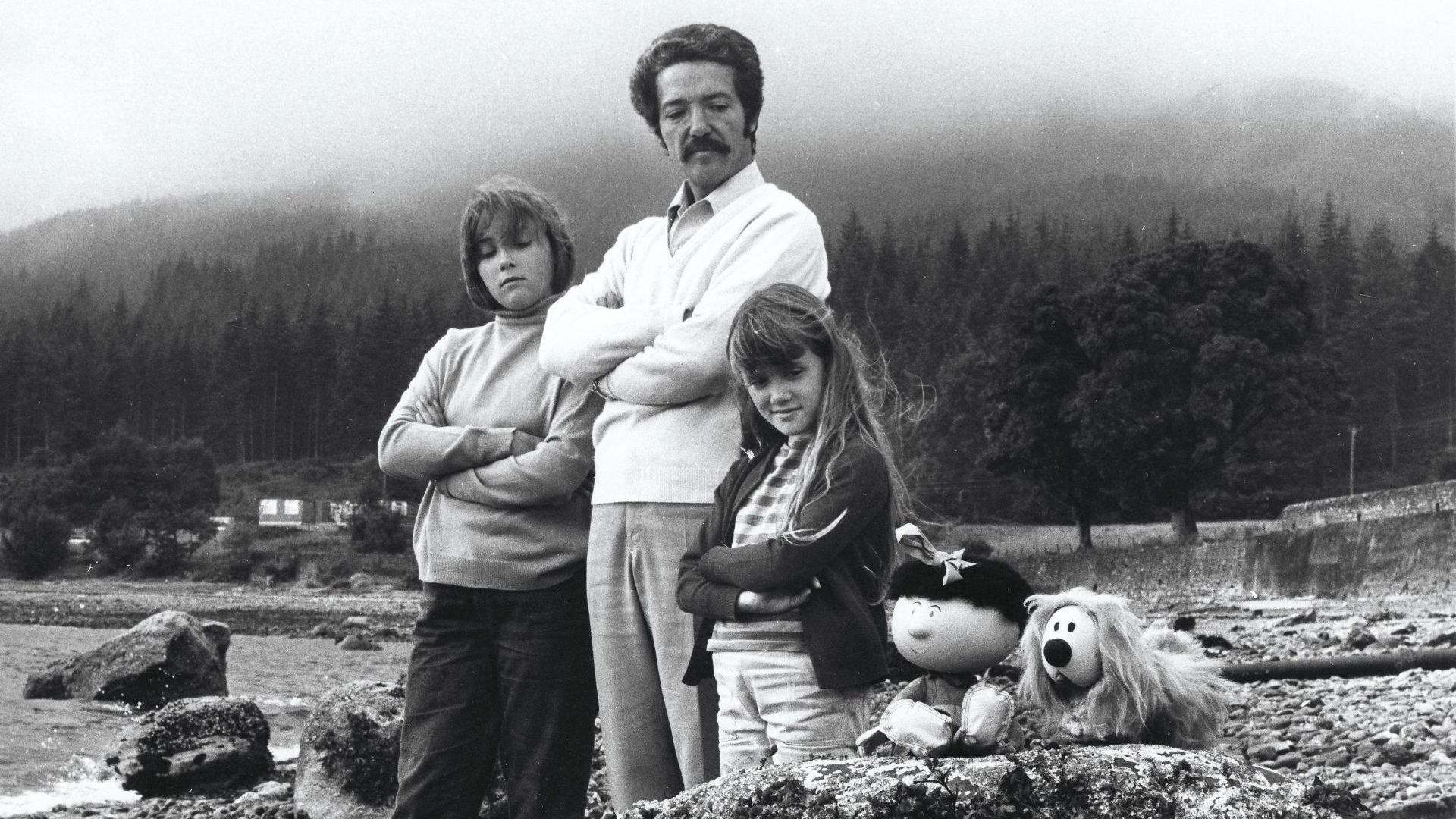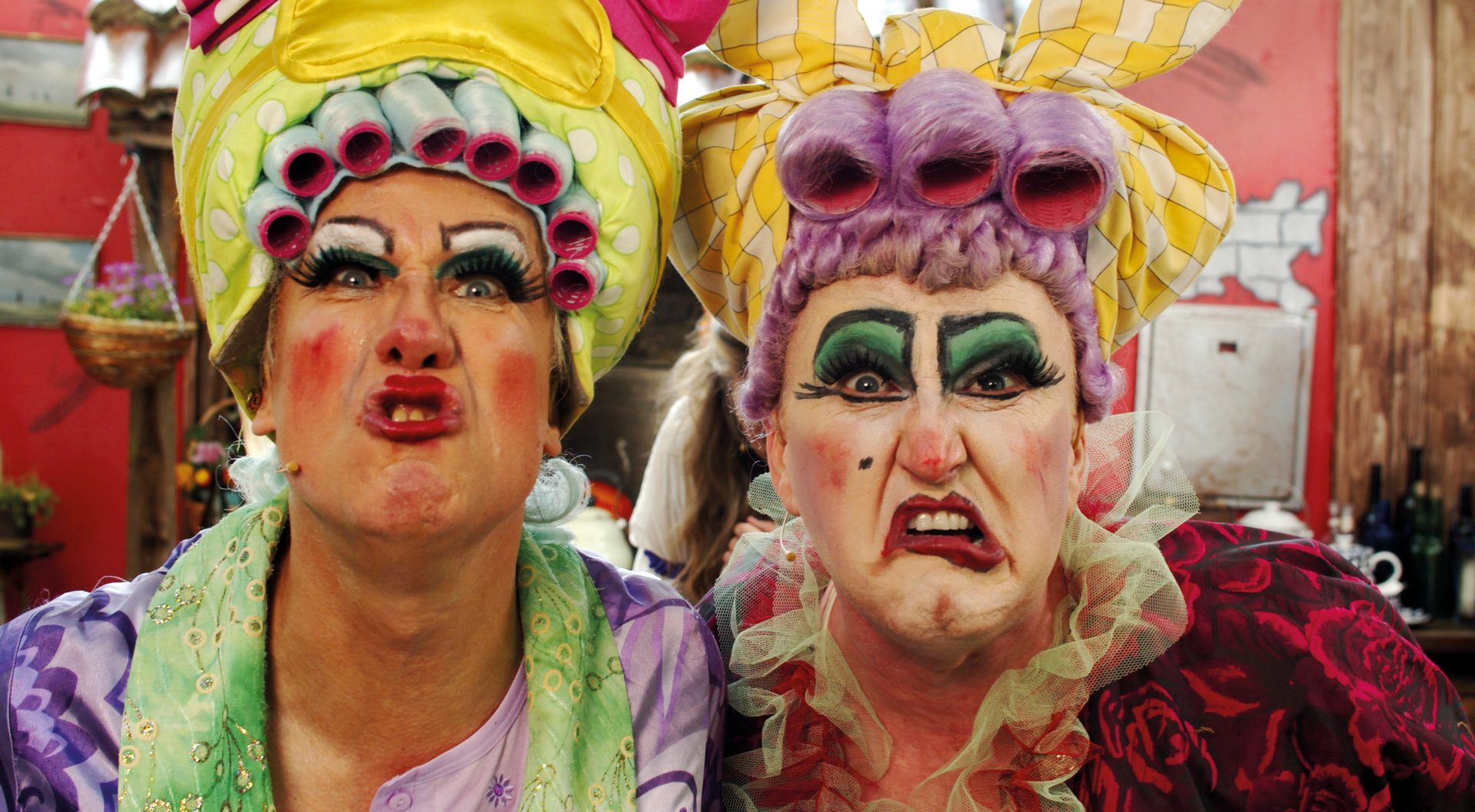A trip to the pictures in early 1972 was a challenging affair. Settling down with your carton of Kia-Ora, you squinted through wisps of cigarette fumes (only Rank cinemas then offered non-smoking sections) at the likes of A Clockwork Orange, Roman Polanski’s bloodsoaked Macbeth and a grisly, sexualised version of the Burke and Hare story. Coming attractions included Clint Eastwood’s nihilistic Dirty Harry, Hammer’s Vampire Circus and Hitchcock’s queasy London serial killer psychodrama Frenzy.
But there was an antidote: a stop-motion animation film from France, with the main characters redubbed by a single British actor. If that didn’t sound like box-office gold, at least Pollux et le Chat Bleu had been a great success two years earlier in its native country. And if the executives were hopeful that the picture might serve as a cure for the gloom in Britain’s flicks, it was less to do with the titular cat than with his canine co-star.
For Pollux in France was Dougal in Britain, where Serge Danot’s Le
Manège Enchanté had become The Magic Roundabout, its scripts completely rewritten by Eric Thompson, an Old Vic veteran, who seemed to have appeared in at least one episode of every serial drama since the late 1950s and who did not speak a word of French.
Hired by the BBC in 1964 and charged with turning Pollux and chums – including Flappy the Spanish rabbit and Azalée the cow – into as big a hit as they had become in France, Thompson took on the task with the same gusto and creativity that Anthea Bell and Derek Hockridge would soon bring to their Asterix translations. His dopey rabbit Dylan (no longer Spanish and renamed after Bob), fussy Ermintrude and cheesed-off Dougal would become as instantly recognisable as the yawning of the mice on the mouse organ or the gargle of the Soup Dragon.
As for having to concoct entirely new stories, this was made somewhat easier by the sheer oddness of Danot’s creation. Set in the Magic Garden, which is a poorly defined distance from the titular funfair ride, the show featured not only the aforementioned characters but also ageing gardener Mr McHenry, a sentient train and grizzled roundabout operator Mr Rusty. The plots, meanwhile, were informed by the character’s main preoccupations, which in the case of Dougal was sugar lumps and looking at the world through a cracked rear-view mirror similar to the one Tony Hancock installed in East Cheam. The tales were also heavy on bickering, magical teleportation, and, yes, the very occasional spin on le manège enchanté.

In so expansive and surreal a landscape, Thompson was free to let his imagination run wild. With Brian the snail, the fragrant Florence, and Zebedee – whatever the hell he was – in tow, Thompson’s version premiered in October 1965, no doubt to the delight of his daughters, and future actresses, Emma and Sophie, then aged five and three.
Running every weekday on BBC One at 5.50pm, just before the tea-time news, the show became just as much a part of the British TV landscape as Eric and Ernie.
It felt so at home in the BBC schedules that, when it was decided to move it to an earlier slot, it wasn’t just kids who complained.
The adult outcry over The Magic Roundabout’s rescheduling is but one part of the lore that’s sprung up around the programme that’s all the more remarkable for being true.
School-run mums and university lecturers didn’t have to wait too long for Auntie to own up to the error of her ways.
If Thompson was reined in a little for Dougal and the Blue Cat, which arrived in France in 1970, this might have been because a feature film has rather more riding on it than a five-minute TV episode.
Serge Danot would also appear to have provided our man with some pretty detailed blueprints, hence the original film and the Thompson translation treading similar paths – which isn’t to suggest that the story is less bizarre than your average Magic Roundabout adventure.
On the contrary, this is a story about Buxton, a blue cat with a thick Northern accent whose arrival in the Magic Garden excites everybody. Everybody, that is, except for Dougal, who’s rather unsettled by the newcomer.

Through ferreting around the neighbourhood – a task that includes a visit to the local treacle factory – our hero discovers that Buxton is an outside force bent on turning everybody and everything the same colour as he is.
Buxton is under the command of the Blue Voice, a presence so foreign to the world of The Magic Roundabout, it’s not even portrayed by Eric Thompson; Fenella Fielding’s breathy tones create a foe – in equal parts seductive and sinister.
Before everything is resolved, Dougal has become prime minister (ironic, that, since French TV executives initially believed Thompson had renamed their Pollux after Charles De Gaulle) and visited the moon, in scenes to which Nick Park’s Wallace & Gromit would pay tribute in A Grand Day Out about 20 years later.
Although only a modest success at the box office, where the film’s duration – 80 minutes longer than a usual TV episode – made it a tough watch for fidgety youngsters, assorted spin-off records and book tie-ins ensured that Dougal and the Blue Cat was a profitable addition to Danot’s animated universe.
There was no feature-length follow-up but the 50-odd years since
its release have seen the film become quite the cult phenomenon. A 2010
DVD release came complete with two cuts of the film, plus interviews with Emma Thompson and her mother, the actress Phyllida Law, who points out that she only ever referred to her husband as Thompson since “Eric is such a silly name.”
There’s also an introduction from BBC film reviewer Mark Kermode, who reserves for Dougal and the Blue Cat the kind of praise he normally saves for The Exorcist, calling it “one of the greatest films ever made… a genuine, surreal work up there with David Lynch, David Cronenberg and Luis Buñuel. Genuinely bonkers.”
That Dougal and the Blue Cat wasn’t the last Magic Roundabout movie is a source of regret rather than excitement. A 2005 retread might have boasted a big-name voice cast – including Ian McKellen, Ray Winstone, Robbie Williams and Kylie Minogue – but shorn of the stop-motion animation that was so much a part of the original’s appeal, it was more tragic than magic.
Rather like making coffee in a microwave, there’s just something incredibly wrong about the idea of a CGI Dylan. And besides, the original animation nicely summed up the cross-channel cooperation that runs right through The Magic Roundabout.
For while the programme might have sprung from the genius of Danot, the stop-motion techniques were overseen by Ivor Wood, a Yorkshireman raised by a French mother, who met his future collaborator while working in a
Parisian advertising agency. He later returned to the UK to make The Herbs, The Wombles, Paddington and other five-minute animated masterpieces.
A glorious advert for pan-European eccentricity, the majesty of The Magic Roundabout is something the French and British will always agree upon.
So, while neither nation now has an empire upon which the sun doesn’t set, it’s rather nice to know that somewhere, for someone, it’s always “time for bed”.



